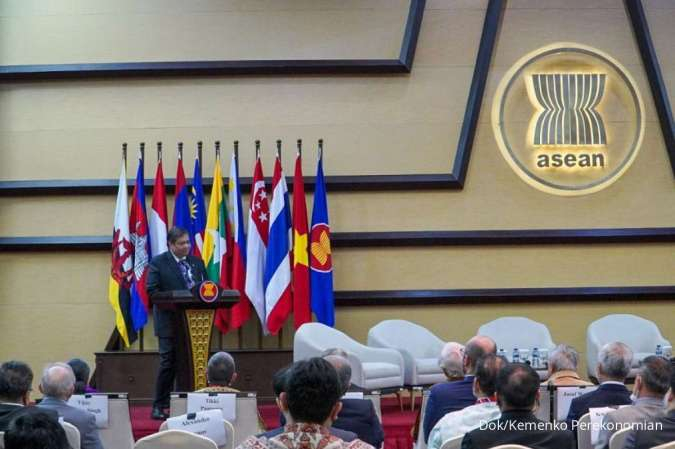Indonesia receives the ASEAN chairmanship relay from Cambodia and will become the ASEAN Chair in 2023.
Handover of the chairmanship took place at the Closing Ceremony of the 40th and 41st ASEAN Summits and related Summits at the Sokha Phnom Penh Hotel, on Sunday, November 13, 2022.
Symbolically, President Joko Widodo (Jokowi) received a gavel from Cambodian Prime Minister Hun Sen as a sign that Indonesia has become the Chair of ASEAN.
Indonesia’s chairmanship will raise the theme of “ASEAN Matters: Epicentrum of Growth.” It is an honor for Indonesia to be the Chair of ASEAN in 2023.
ASEAN must become a stable and peaceful region as well as an anchor of world stability. The ASEAN should also consistently uphold international law and not act as a proxy for anyone.
ASEAN must become a dignified region and uphold human and democratic values, President Joko Widodo affirmed.
The president is also keen that the ASEAN become a fast-growing, inclusive, and sustainable economic region.
Increasing the capacity of ASEAN institutions must also be a concern in order to respond to challenges of the next two decades.
The president is optimistic that by 2045, the ASEAN will be more adaptive, responsive, and competitive.
All of this must be fought for in the ASEAN way, which is consistent, with the spirit of cooperation and fully implementing the ASEAN Charter.
The president invited all ASEAN leaders to attend the ASEAN Summit in Indonesia next year.
Important and relevant
Meanwhile, Minister of Foreign Affairs Retno Marsudi said Indonesia’s chairmanship of ASEAN in 2023 took the theme of “ASEAN Matters: Epicentrum of Growth.”
Indonesia wants ASEAN to remain important and relevant to make ASEAN matter and to be important and relevant internally for the people and externally for the Indo-Pacific region and the world.
It is with this rationale in mind that Indonesia’s chairmanship will adopt the theme “ASEAN Matters: Epicentrum of Growth.”
Marsudi said the logo of the ASEAN chairmanship, conveyed by President Joko Widodo at the handover of the ASEAN chairmanship from Cambodia to Indonesia, depicts the sky, mountains, sea, and earth as well as the Maleo bird as one of Indonesia’s several faunal species.
The sky is a visualization of embracing and nurturing. The mountains and the earth are visualizations of solidity and stability. The mountains also symbolize an optimistic direction of growth, the minister of foreign affairs stated.
Mountain formations indicate upward growth. As a representation of direction, this visualization has the meaning of bringing the whole of ASEAN to grow in a better direction.
The ocean is conceptually a link and unifier for each island between countries in the region.
The symbolization of fauna with the profile of the Maleo bird is a representation of the archipelago’s rich biodiversity, as the Maleo is a typical bird endemic to Sulawesi, Indonesia.
The overall form of the symbol is very dynamic, responsive, and adaptive in response to all changes that occur internally and externally.
ASEAN has three pillars of cooperation: the political-security pillar, economic pillar, and socio-cultural pillar.
During the chairmanship, handling of the political and security pillars will be coordinated by the coordinating minister for politics, legal, and security affairs and the minister of foreign affairs.
The economic pillar will be coordinated by the coordinating minister for economic affairs and the socio-cultural pillar by the coordinating minister for human development and culture.
Next year, the first activity will be a meeting of the minister of foreign affairs in the form of a retreat that will be held in January. In order to maximize the use of the ASEAN Secretariat building, most meetings at the technical level will be held at the ASEAN Secretariat, Jakarta.
The new ASEAN Secretariat building has adequate meeting rooms that are suitable for ASEAN meetings.
Due to this, the ASEAN Leaders Meeting in April was held at the ASEAN Secretariat.
The special meeting of Ministers of Foreign Affairs was also held at the ASEAN Secretariat.
It is estimated that more than 50 meetings will be held at the ASEAN Secretariat next year.
Indonesia will also hold flagship events during the ASEAN chairmanship, including the Indo Pacific Infrastructure Forum and the ASEAN Creative Economy Business Forum.
With good intentions and hard work, Indonesia’s chairmanship in the ASEAN is expected to bring benefits not only to Indonesians but also to the people of ASEAN and the world.
Multidimensional challenges
Indonesia’s chairmanship in the ASEAN in 2023 comes in the midst of world conditions that are not yet conducive and an array of multidimensional challenges. This chairmanship will take effect from January 1 to December 31, 2023.
Foreign Minister Marsudi said that Indonesia’s chairmanship came amid tough global conditions.
From a geopolitical and economic standpoint, the situation is still not conducive, and the world continues to experience multidimensional challenges.
In terms of challenges from a geopolitical perspective, rivalry will remain sharp. The ASEAN hopes that this rivalry would still be managed, so that no open conflicts or new wars arise. Similar management is also important in the Indo-Pacific region and also in Southeast Asia.
From a global economic standpoint, if countries across the world do not immediately strengthen cooperation, especially for overcoming the food and energy crises, then the fiscal space of developing countries will become increasingly narrow. The foreign affairs minister cautioned that the world’s economic situation next year will then get even worse.
The ASEAN community should be grateful that amid projections of continued decline of economic growth, the Southeast Asian region’s economic growth is above the average global economic growth.
This region has indeed been affected by a fairly deep financial crisis, but after that, Southeast Asia has had a fairly strong economic performance.
The foreign minister said economic growth in the ASEAN region was almost always above the world’s average growth. For instance, ASEAN’s economic growth in 2012 was 6.2 percent, while the world’s economic growth was recorded at 2.7 percent.
Likewise, ASEAN’s economic growth in 2015 was recorded at 4.8 percent, while the world’s economic growth stood at 3.1 percent. In 2018, ASEAN’s economic growth in 2018 was clocked at 5.2 percent, while the world’s economic growth was at 3.3 percent.
In 2019, ASEAN’s economic growth was recorded at 4.6 percent, while the world’s economic growth was 2.6 percent.
Economic growth in the ASEAN region is projected at 5.1 percent in 2022, which is forecast to be higher than the world’s economic growth of 3.2 percent.
If we look at the economic performance of each ASEAN country this year, it is also quite good, for example, Indonesia.
For the third quarter, Indonesia posted an economic growth of 5.72 percent, up from 5.4 percent in the second quarter, the foreign minister noted.
This trend is what Indonesia is keen to maintain. Indonesia is striving to make the Southeast Asian region remain as the hub or Epicentrum of Growth. ASEAN remains capable of being the driver of regional stability and maintaining its centrality.










